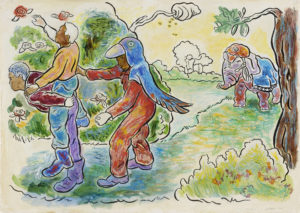John Bankston at Rena Bransten

John Bankston constructs a fantastical world of male—or at least masculine—characters, including a leatherman with an eye-patch, a ringmaster in a top hat, bearded ladies, a tribe of birdmen, and a band of masked wrestlers. In this show, his paintings were set in the woods where a circus had pitched its tent, and presented portraits of these various characters along with scenes of them interacting with one another. Bankston employs paint with the economy of a draftsman, and the figures in his pictures look almost like comic book characters—both because of their elaborate costumes, and because of the way they are outlined. His palate is bright and colorful. And the curved lines of his compositions give his paintings an effeminate air, which informs their exploration of the ambivalence of gender.
In Before the Match, three masked wrestlers stood together talking in their body suits. They were athletes sharing the camaraderie of a specifically male context. They could have been brothers or merely friends. But there was also something distinctly erotic about the scene. The wresters’ suits bulged, and we knew they were about to engage in a hot, sweaty embrace. In Rose Bush, one man rode on the back of another picking roses from a bush. The sexuality of the image was unavoidable, but again the scene might also have been familial or merely friendly.
The fantastical quality of Bankston’s pictures makes them psychologically immediate, and the distinct characters in the scenes he depicts might just as well be thought of as different aspects of mental life. Love, friendship, and sexual desire inform one another in complex ways—presenting a broad spectrum of different possible relationships between men, and different possible ways of identifying as a man.
In Step Right Up, a carnival barker invited the viewer to a fair, complete with tents, a lion, a bearded lady, a wrestler strong man, and a ride swirling over their heads. For Bankston, gender—and masculinity in particular—is a circus sideshow in which we all are exotics.
At the same time as Bankston’s show and in the same building, Heather Marx Gallery mounted an exhibition of paintings by Forrest Williams, titled Passage, which also addressed questions concerning male identity and relationships between men—although from a decidedly more anxious and alienated vantage. Together the two shows made a particularly interesting study.
